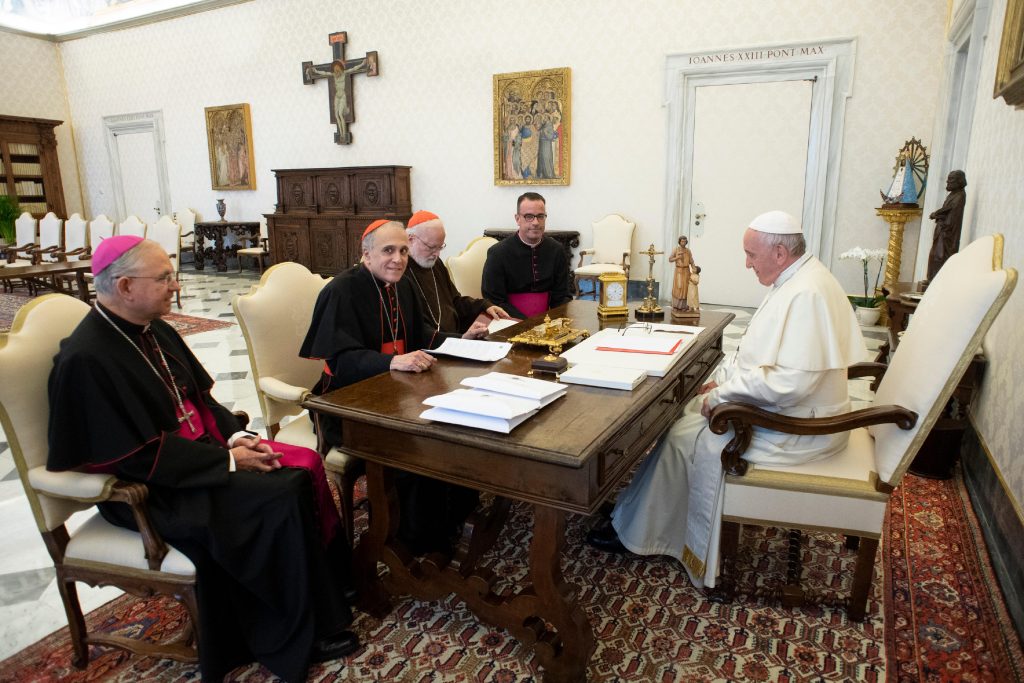ROME — Under the heading of life’s occasional sense of irony, sometimes the more energy you put into anticipating an event, the less it seems to deliver when it finally happens. Such seemed the case last Thursday, with a highly anticipated encounter between Pope Francis and the leadership of the US bishops’ conference.
Cardinal Daniel DiNardo of Galveston-Houston and Archbishop José H. Gomez of Los Angeles, the president and vice president of the conference, had come to Rome, joined by Msgr. Brian Bransfield, the conference’s secretary, and Cardinal Sean O’Malley of Boston as head of the Pontifical Commission for the Protection of Minors, to seek Francis’ blessing for a probe into the scandals surrounding ex-Cardinal Theodore McCarrick.
On August 16, DiNardo said the bishops would propose to Pope Francis that he initiate an apostolic visitation, which is a standard Vatican mechanism for investigating the affairs of a particular country or group.
After the meeting wrapped up, however, the Vatican didn’t say word one about what had happened, and the U.S. bishops restricted themselves to the following:
“We are grateful to the Holy Father for receiving us in audience. We shared with Pope Francis our situation in the United States — how the Body of Christ is lacerated by the evil of sexual abuse. He listened very deeply from the heart. It was a lengthy, fruitful, and good exchange,” the bishops said.
“As we departed the audience, we prayed the Angelus together for God’s mercy and strength as we work to heal the wounds,” they said. “We look forward to actively continuing our discernment together identifying the most effective next steps.”
Notably absent is any mention of an apostolic visitation, or, for that matter, any indication at all of what those “most effective next steps” might be.
As of this writing, it’s been four days since the meeting occurred and we still don’t know officially what became of the idea of a visitation, though the smart money is on it not happening, at least not as originally conceived — because, if it were, why wouldn’t someone just come out and say so?
Background chatter has it that there will be no Vatican-backed probe, and therefore whatever investigation of the McCarrick case occurs will be under the aegis of the U.S. bishops. If so, one obvious question will be what sort of access that probe will have to Vatican records, since figuring out what Rome knew, and when it knew it, is an unavoidable dimension of the full story.
It’s all the more essential to clarify Rome’s role due to the bombshell accusation leveled against Pope Francis by Italian Archbishop Carlo Maria Viganò, a former papal ambassador in the U.S., who claims he personally briefed Francis about sexual misconduct concerns with McCarrick and the pontiff failed to take action.
Despite the pontiff’s personal strategy so far of ignoring that accusation, the Vatican is said to be preparing a set of “clarifications,” which may well generate more questions. In any event, it’s hard to imagine public curiosity is going to be satisfied by simple assurances.
Meanwhile, one day before DiNardo and Gomez had their tête-à-tête with Francis, the Vatican announced that the pope has summoned all the presidents of bishops’ conferences from around the world to Rome Feb. 21-24 for a summit on the protection of minors.
In effect, the gathering amounts to an extraordinary synod, though for the moment it’s not being given that name.
The announcement was taken as a sign of resolve by Francis in some quarters, though critics wondered why, if this is such a priority, the pope is taking a full five months to get the bishops together.
Adjudicating between hope and skepticism is complicated by the fact that five days after the announcement, we still don’t know who’s going to be leading the summit, who’s going to be advising the bishops, what’s on the agenda, and what specific action items may be under consideration.
Everyone in Church leadership who’s commented on the abuse scandals has insisted on the need for transparency as part of any effective response. Yet frankly, one could be forgiven for thinking that if this is transparency, I’d hate to see obscurity.
The McCarrick situation, by the way, is not the only thing frustrating reformers and abuse survivors at the moment. Four months after all the bishops of Chile offered their resignations en masse for presiding over a colossal series of abuse scandals in their country, Pope Francis has only accepted five, and in every case there’s been no official explanation as to why.
There’s also been no indication from Rome of any plans to move toward a new system for imposing accountability, not just for the crime of child abuse but also the cover-up.
Perhaps such a system will be on the to-do list for the February summit, but in any event, most analysts would say that’s the largest piece of unfinished business in terms of the effort to learn the lessons of the crisis.
Although it’s impossible to say right now when answers may begin to fall into place, given the anger level today among rank-and-file Catholics of all stripes, leadership might be well advised not to assume that patience is infinite.
SPECIAL OFFER! 44 issues of Angelus for just $25! For less than 50 cents a week, get the finest in Catholic journalism with first-rate analysis of the events and trends shaping the Church and the world, plus the practical advice from the world’s best spiritual writers on prayer and Catholic living, along with great features about Catholic life in Los Angeles. Subscribe now!

